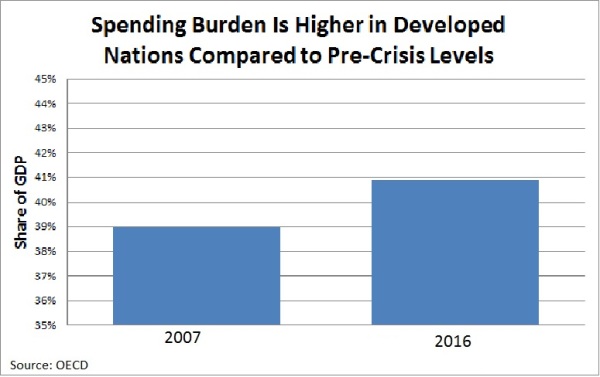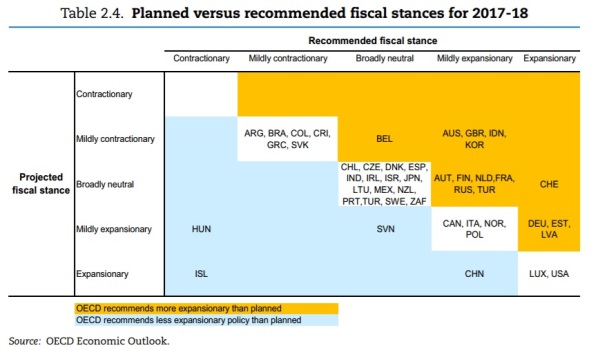Earlier this year, I criticized the Organization for Economic Cooperation and Development for endorsing an orgy of Keynesian spending.
Did my criticism have an effect? Well, the bureaucrats in Paris just issued a new report that bluntly suggests a reorientation of fiscal policy to achieve more growth.
…the global economy remains in a low-growth trap with weak investment, trade, productivity and wage growth and rising inequality in some countries. …a stronger fiscal policy response is needed to boost near-term growth and strengthen long-term prospects for inclusive growth.
Sounds good to me. I welcome sinners who want to repent. Is the OECD now recommending corporate tax rate reductions? A flat tax? Entitlement reform? Elimination of wasteful departments, agencies, and programs? A spending cap?
Don’t be silly. This is the OECD. Some of the professional economists are sensible and competent, but major policy initiatives almost always are determined by the high-level hacks who crank out proposals designed to give cover to politicians that want ever-more taxes and spending.
So when the bureaucrats in Paris suggest “a stronger fiscal policy response,” they’re actually advocating for more government. Which is exactly what they did back in February. And what they’ve been repetitively doing all during the Obama Administration. I’m not joking. Here are some further excerpts.
…this chapter emphasises the need for a fiscal initiative…to foster productivity in the medium to long term. Measures should be chosen depending on each country’s most pressing needs and could include not only raising soft and hard infrastructure or education spending… In many countries, such a package could be deficit-financed for a few years, before turning budget-neutral.
The OECD says that “stimulus” would be a good idea because nations now have more “fiscal space,” which is bureaucrat-speak for an estimate of how much additional red ink is supposedly feasible feasible given interest rates, existing debt levels, and other variables.
I’m more worried, for what it’s worth, about the level of spending. And on that basis, there’s less fiscal space. Here’s a comparison (based on the OECD’s own dataset) of the burden of spending before the great recession/global financial crisis and today. As you can see, government outlays are consuming almost 2-percentage points more of economic output.

Needless to say, there’s hasn’t been much “austerity” over the past decade (other than higher income taxes and higher VAT taxes, which means taxpayers have taken a hit but not bureaucrats and interest groups).
In any event, the OECD ignores all this evidence and thinks today is the perfect time for another spending binge. Here are additional details from the report.
OECD governments could finance a ½ percentage point of GDP productivity-enhancing fiscal initiative, for three to four years on average in OECD countries without raising the debt-to-GDP ratio in the medium term, provided the selected activities and projects are sound. Such an initiative could encompass high-quality spending on education, health and research and development as well as green infrastructure that all bring significant output gains in the long run. …the average output gains for the large advanced economies of such a fiscal initiative amount to 0.4-0.6% in the first year.
It’s laughable that the bureaucrats project more growth as a result of Keynesian “stimulus” even though we just suffered through the failure of Obama’s 2009 program (not to mention the repeated failure of Keynesian economics in Japan and elsewhere).
The only good news, if we grade on a curve, is that the bureaucrats apparently don’t think Keynesian “stimulus” would be that helpful for the American economy.

Though I’m worried this Table, buried four pages from the end of the report, won’t get much attention (just as other decent portions of the report, such as commentary about the damage caused by bad tax policy, also will get ignored).
If you think I’m being paranoid, check out these passages from a news report in the Wall Street Journal. The main takeaway from the OECD’s new publication, according to the reporter, is that politicians around the world have a green light for more wasteful spending.
Adding detail to earlier calls for a switch to budget stimulus from exhausted monetary policies, the Paris-based think tank said most governments have room to boost spending by half a percentage point of economic output over a period of three to four years without risking an increase in their already high debts. …The think tank calculates that an increase in spending on the scale it recommends would lift economic growth in the countries involved by between 0.4 and 0.6 of a percentage point, with an additional 0.2 percentage point boost if the effort were to be coordinated internationally. …If governments were to follow the OECD’s advice, it would mark a further turn away from the policies of austerity that were an immediate response to surging government debts in the aftermath of the 2008 financial crisis. …A slow shift toward a greater reliance on fiscal policy has been under way since last year, when Canada embarked on a fiscal stimulus, while the OECD noted that increases in spending are also under way in Germany, Italy and China. …“There is quite a bit more receptivity to the notion of using fiscal policy more actively,” said Ms. Mann.
And I’m worried that this kind of bad advice may influence President-Elect Trump, who already has made worrisome comments about spending for infrastructure and entitlements.
P.S. But I’m semi-hopeful that Trump won’t be a fan of the OECD in general, if for no other reason than the head bureaucrat in Paris called him a racist and was remarkably open about favoring Hillary Clinton’s election.
Gurria tells UpFront’s Mehdi Hasan: “I would tend to agree with those who say that this is not only misinformed, but yes, I think the word racist can be applied. “I think that because the American public is wise, it will then act in consequence,” Gurria adds.
I’ve previously argued that ending American subsidies for the OECD (and its leftist agenda) is an IQ test for Republicans. In prior years, GOPers on Capitol Hill have failed this test. Maybe Trump, if for no other reason than Secretary General Gurria’s harsh attack, will finally end the gravy train for this parasitical bureaucracy.
